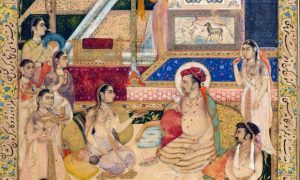Rafia Zakaria in The Guardian:
 Jahangir’s course is directed by a woeman and is now, as it were, shut up by her so that all justice or care of anything or publique affayres either sleeps or depends on her, who is most unaccesible than any goddesse or mistery of heathen impietye.” So wrote in 1617 the disgruntled Thomas Roe, then British ambassador to the Mughal court, of the influence of the emperor’s 20th wife, Nur Jahan. Men everywhere, it seems, were threatened by the rise and reign of women, their racism and misogyny tied together in knots.
Jahangir’s course is directed by a woeman and is now, as it were, shut up by her so that all justice or care of anything or publique affayres either sleeps or depends on her, who is most unaccesible than any goddesse or mistery of heathen impietye.” So wrote in 1617 the disgruntled Thomas Roe, then British ambassador to the Mughal court, of the influence of the emperor’s 20th wife, Nur Jahan. Men everywhere, it seems, were threatened by the rise and reign of women, their racism and misogyny tied together in knots.
It is the disentanglement of some of these that Ruby Lal attempts in Empress, a luminous biography of a woman dabbed out of history, first by vengeful successors to her husband, the emperor Jahangir, then by colonialist historians and ultimately bynationalists who wanted to write their own history of the empire. What Lal presents is the story of a woman from the imperial harem without the usual obsession with the harem as a realm of cheap erotic associations. It is a captivating account, its depth of detail recreating a world whose constraints of lineage would seem to preclude the advance of an unknown, self-made, widowed queen. Nur Jehan was born Mihr-un-Nisa to noble but refugee parents, Asmat and Ghias, who fled Iran following Ghias’s fall from favour in the court there. It was a hurried exit; the two and their retinue had to join a commercial caravan despite the fact that Asmat was visibly pregnant. The baby, the intrepid empress-to-be, was born by the side of the road, near the town of Kandahar, her birth “a moment of pleasure to the caravan community amid the hardships of the road”.
More here.
